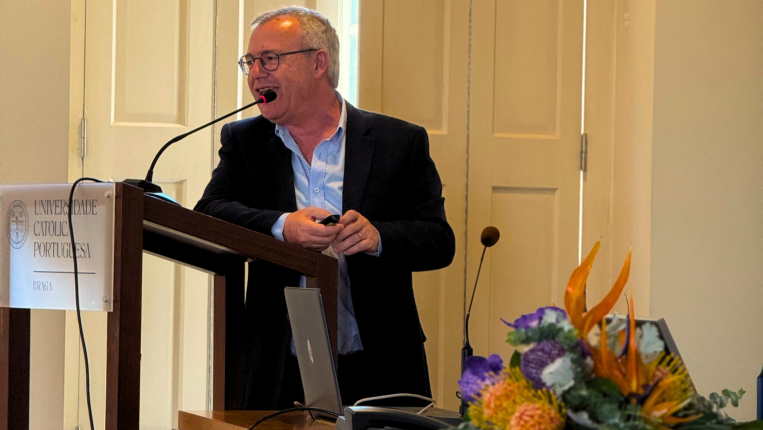
On May 5, 2025, a session commemorating World Portuguese Language Day was held at the Isidro Alves Auditorium of the Portuguese Catholic University (UCP) - Braga, organised by the degree in Portuguese Studies and attended by academic authorities, teachers and students from various courses.
Speakers included Djaimilia Pereira de Almeida, an award-winning Portuguese-Angolan writer and contributor to publications such as the digital newspaper Observador and the multi-platform Brazilian literary magazine Quatro Cinco Um; and Augusto Soares da Silva, Full Professor of Linguistics at the Faculty of Philosophy and Social Sciences (FFCS) of UCP - Braga, who coordinates two research projects comparing European Portuguese and Brazilian Portuguese.
In her speech, entitled ‘My language’, Djaimilia Pereira de Almeida addressed, in a poetic tone, the most intimate and identifiable aspects of the use of the Portuguese language by people from countries colonised by Portugal. For her, the language has no race or borders, living and evolving regardless of normative impositions. On these, she emphasised, among other examples, her disagreement with the Orthographic Agreement. The writer also emphasised that language is not an abstract entity, but is linked to experiences, both individual and collective, and is an instrument of hospitality, providing comfort and ‘little islands of kindness’ in everyday life.
Augusto Soares da Silva's speech sought to answer the question that formed its title: ‘Portuguese is two, three, how many?’. To this end, he began by placing Portuguese among the most widely spoken languages in the world, both as a mother tongue and as a second language, and emphasised its enormous potential for future expansion, as pointed out by the ONU.
The FFCS lecturer defined Portuguese as a pluricentric language, which currently has two clearly established patterns - European Portuguese and Brazilian Portuguese - and which, in the coming years, should include Angolan Portuguese and Mozambican Portuguese. In these two patterns there is a phenomenon of nativisation, whose common traits with Brazilian Portuguese recall the movements of African populations to Brazil. Other ‘Portuguese’ may emerge in the future, especially in São Tomé and Príncipe, but possibly also in other countries of the Community of Portuguese Speaking Countries (CPLP). Augusto Soares da Silva emphasised the enormous influence of Brazilian Portuguese and the difficulties its speakers have in understanding European Portuguese. In this context, he recognised that the Orthographic Agreement was a mistake. Regarding the influence of the Brazilian community living in Portugal, although there are no concrete studies yet, he believes that it will continue to manifest itself mainly in terms of culture, but not so much in terms of language, as the experience of previous decades seems to indicate. The FFCS lecturer pointed to the need to standardise the various variants of Portuguese spoken in the CPLP, and used the example of Spanish to highlight the importance of developing a pan-Portuguese standard in order to achieve a greater global impact at all levels.
After the speeches, there was a very enriching debate on the problem of the Portuguese language, particularly with regard to the challenges created for the Portuguese education system by the presence of various CPLP communities.



